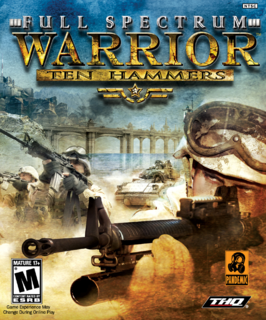Often satisfying but still frustrating at times, this is a worthy attempt at tactical gameplay that lacks polish.
Unfortunately the negative aspects of the experience cannot be ignored. Most are inherent in the game's rigidity and the in the obvious limitations of its engine. Some mission phases can be teeth-grindingly frustrating when the game does not play fair: RPGs sometimes seem capable of flying around corners after being aimed with no apparent line-of-sight between operator and target, player-controlled teams are often three full seconds slower in their reaction to a threat than the player himself is and there is absolutely no close to mid-range combat modelled, so you may as well take your hands off the keyboard and hope for the best if you get much closer than the medium-range tactical arena modelled by FSW's engine. I do not mind the game being difficult (it is) but I object when a combination of dodgy mission design/implementation and glitchiness conspires to kill my guys repeatedly, forcing me to replay great chunks of a mission again and again because the replay system, while much better than the original game's, still doles out save points somewhat reluctantly. Other glitches include soldier abilities -- like the team-leader's sharpshooter option -- that are sometimes inexplicably unavailable, odd interface issues, poor documentation (although they try hard) and, above all, unfair line-of-sight and lethality as wielded by the enemy AI. Several times my squad has been decimated by an RPG that they were way too slow to spot, slower still to react to and slow as mollasses to avoid, considering it trails smoke and spends two full seconds in flight. The gameplay is essentially a combination of geometry problems (flanking, angles, cover) requiring considerable patience to overcome a system of maneuver that can become very stiff and inflexible at times. On the one hand it's tactically sound always to look before you leap but a little iffier when you are being cautious not because it's appropriate but in order to anticipate and accomodate yourself to AI or gameplay eccentricities. Gameplay is stately, undynamic, methodical and sometimes quite satisfying once you adapt to its pace.
All this underlines the fact that TEN HAMMERS is a very specialised game, limited by its own engine and by budget. Lacking polish or glamour, it's more of a geeked-out RTS-third-person shooter hybrid than a mass entertainment but it will satisfy those with genuine interest in squad-level tactics in hostile urban terrain. Its engine does one thing very well (simulate mid-range, small-unit MOUT) most of the time, but not when the design and/or execution takes a big brain-dump and starts trying the patience of a player who has been lulled into a false sense of security by the gratification the game provides when is does actually deliver on its promise, which is about seventy percent of the time.
With the dreadful decline of the Rainbow Six franchise, I'm just grateful for any genuinely tactical combat simulation out there and this, for all its faults, is that. The designers are obviously dedicated and knowlegeable and they have squeezed every bit of flexibility and potential that they could out of this engine. When it works, it's great. The AI is improved significantly but, again, it's at the mercy of an overall concept/implementation that sometimes works and sometimes doesn't. Production values like sound, visuals and voice acting are fine for what is a non mass-appeal game whose principal platform is the console. I'm appreciative that, if it's a port for the PC, it's been ported so intelligently. I'd recommend it to hardcore, grown-up tac-gamers with patience and a willingness not to become too frustrated by the glitches in order to appreciate TEN HAMMERS' genuine virtues. But even this hardcore, grown-up tac-gamer is likely to put it aside when GHOST RECON: ADVANCED WARFIGHTER comes out for the PC, if it's half as good as it threatens to be, that is.

